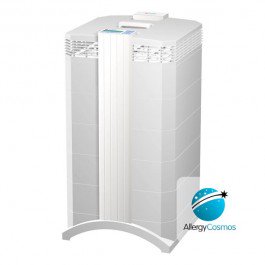If you struggle with reducing asthma symptoms, you may well be exposed to a range of asthma triggers in the air – including mould spores, pollen, pet dander, traffic pollution and house dust mite allergens.
If so, a good asthma air purifier will be the most effective way to take asthma triggers out of the air. Recent research shows how the right air cleaners benefit people with asthma. Professor John Warner of Imperial College, London, with colleagues at other European centres, looked at the impact of air cleaners on a group of patients with asthma. The air cleaning system delivered clean, purified air to the breathing zone of the patient, thus displacing, capturing and retaining airborne allergens from the air previously present.
The air purifier research study involved a group of 282 patients with atopic asthma from six countries, aged between 7 and 70. Fifty-four British children were included. These were all patients whose asthma was poorly controlled, so they had much to gain if the trial proved successful. During the air cleaner research study, two-thirds had an active air cleaner installed in their bedroom and the rest had a placebo (dummy) machine. It was switched on at bedtime and switched off again on waking.
At the end of one year, patients’ quality of life was assessed using the Asthma Quality of Life Questionnaire. There was a significant improvement of 15 per cent in those who had been exposed to the air cleaner system compared to those who had only been exposed to the placebo. Improvements were most marked among those with the most severe asthma. However, no differences in lung function were noted between air cleaner treatment and exposure groups, although those on active treatment were found to have less airway inflammation.
This air cleaner research study is interesting because previous research has suggested that allergen avoidance, through the use of air purification, does not always have the same significant positive impact. The reason seems to be that not all air cleaners are the same – performance and effectiveness greatly varies between different brands of air cleaners. Effective air purification technology will achieve a significant reduction in allergen load and general pollution in the air. The cost of a good air cleaner is important. However, even at £1,000 per unit, a high-quality asthma air cleaner can prove a very cost-effective investment because long-term use can lead to substantial savings in medication costs and hospital admissions. This is particularly so for those with poorly controlled asthma where often the only option is to increase medication. Costs aside, many people with asthma do not want to depend upon medication to control their asthma. Particularly, parents may not wish to see their children suffering with asthma having to take so many drugs that come with sometimes severe side effects.
More affordable but also ‘medical grade’ air purifiers such as the IQAir HealthPro 250 also allow you to capture and retain particle pollution including bacteria and viruses as well as gases and chemicals and thus are a very attractive alternative.
Source: Boyle et al (2011). Nocturnal temperature controlled laminar airflow for treating atopic asthma: a randomised controlled trial. Thorax 87; 215-221




